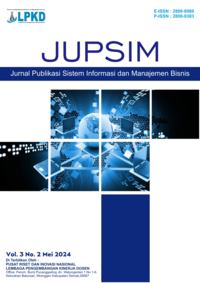Mengungkap Optimalisasi Kinerja Pegawai: Peran Budaya Kerja, Motivasi Kerja dan Kepuasan Kerja Sebagai Mediator
DOI:
https://doi.org/10.55606/jupsim.v4i1.3949Kata Kunci:
Bank Indonesia, Employee Performance, Job Satisfaction, Organizational Culture, Work MotivationAbstrak
This study aims to explore the optimization of employee performance through the influence of organizational culture and work motivation, taking job satisfaction into account as a mediating variable. The research focuses on employees at the Representative Office of Bank Indonesia in Gorontalo Province, representing a public institution with high professional demands. The main issue addressed is the suboptimal employee performance despite the presence of established organizational cultural values and motivational efforts. A quantitative approach was employed using a causal explanatory design, involving the entire population of organic employees (n=35) as respondents. Data were collected through questionnaires and analyzed using the Partial Least Squares Structural Equation Modeling (PLS-SEM) method. The results indicate that organizational culture does not significantly influence employee performance, either directly or through job satisfaction. In contrast, work motivation significantly affects job satisfaction but has no direct effect on performance. Job satisfaction is proven to fully mediate the relationship between work motivation and employee performance. These findings suggest that performance improvement cannot be achieved merely through cultural internalization or motivational efforts, but through the creation of work conditions that foster employees' psychological satisfaction. The conclusion emphasizes the importance of human resource management strategies focused on enhancing job satisfaction as a key to optimizing employee performance, while also contributing theoretically to the development of organizational behavior models in the public sector.
Referensi
Abdi, S. D., Sabwami, B. P., & Ongesa, T. (2024). Employee extrinsic motivation and performance of health care workers at Garissa County Referral Hospital, Kenya. Human Resource and Leadership Journal, 9(3), 34–43. https://doi.org/10.47941/hrlj.1977
Adam, A.-K. (2023). The impact of work culture and job satisfaction with drivers: Total effect regression test using JASP. Journal of Organizational Behavior Research, 8(2), 184–199. https://doi.org/10.51847/uLuZQg6qAu
Aggarwal, P. J. (2023). Service quality dimensions in the context of Herzberg two factor theory. International Journal of Asian Business and Information Management, 14(1), 1–14. https://doi.org/10.4018/ijabim.325231
Akbar, P., Pribadi, U., & Purnomo, E. P. (2020). Faktor-faktor yang mempengaruhi kinerja pegawai dalam penerapan Sidalih di Komisi Pemilihan Umum Daerah Istimewa Yogyakarta. Analitika, 12(1), 1–9. https://doi.org/10.31289/analitika.v12i1.3350
Al-Mutawakel, A. (2023). Job satisfaction and its effects on staff performance of Al Thawra Hospital in Sana’a, Yemen. Thamar University Journal of Natural & Applied Sciences, 7(7), 47–58. https://doi.org/10.59167/tujnas.v7i7.1342
Astuti, S. D., Shodikin, A., & Ud-Din, M. (2020). Islamic leadership, Islamic work culture, and employee performance: The mediating role of work motivation and job satisfaction. The Journal of Asian Finance, Economics and Business, 7(11), 1059–1068. https://doi.org/10.13106/jafeb.2020.vol7.no11.1059
Azizi, B., & Mohammadi, M. (2023). The relationship between organizational culture and organizational entrepreneurship of employees of Sports and Youth in Hamadan Province, Iran. Revista Administração em Diálogo - RAD, 25(3), 64–76. https://doi.org/10.23925/2178-0080.2023v25i3.59060
Bank Indonesia. (2024). Pedoman program budaya kerja. Departemen SDM BI.
Cao, T. H. V., Chai, D. S., Nguyen, L. P., Nguyen, H. T. H., Han, C. S., & Park, S. (2025). Learning organization and employee performance: The mediating role of job satisfaction in the Vietnamese context. Learning Organization, 32(7), 53–73. https://doi.org/10.1108/TLO-09-2023-0177
Chu, H., & Guo, H. (2023). The effects of organizational culture and informal organizational communication on retention intention and innovation behavior - A study based on Chinese R&D employees. The Euraseans Journal on Global Socio-Economic Dynamics, 6(43), 31–40. https://doi.org/10.35678/2539-5645.6(43).2023.31-40
Dharma, Y. (2018). The effect of work motivation on the employee performance with organization citizenship behavior as intervening variable at Bank Aceh Syariah. Emerald Reach Proceedings Series, 1, 7–12. https://doi.org/10.1108/978-1-78756-793-1-00065
Fasha, A. K. R., Lestari, H., & Usman, O. (2019). Influence of motivation work, discipline of work, work environment, cultural organization, and compensation to the performance of employees. SSRN Electronic Journal. https://doi.org/10.2139/ssrn.3311306
Firdaus, A., Ruliana, T., & Indrawati, A. (2024). The influence of discipline and work ethics, as well as work environment, on employee performance through job satisfaction as an intervening variable among employees of the East Kutai Regional House of Representatives. El-Mal: Jurnal Kajian Ekonomi & Bisnis Islam, 5(12). https://doi.org/10.47467/elmal.v5i12.5263
Greene, J., Jones, L. P., & Greene, M. G. (2023). Acquisition and retention of skilled employees: A study of international companies in rural Giles County, Tennessee. Open Journal of Business and Management, 11(6), 3021–3047. https://doi.org/10.4236/ojbm.2023.116166
Halim, A., Susianah, S., Gunawan, G., Mansyur, A., & Tirtawana, M. (2024). Human resource management strategy: Integrating psychological perspectives through qualitative description and literature review. Golden Ratio of Human Resource Management, 4(2), 110–122. https://doi.org/10.52970/grhrm.v4i2.484
Hazmi, C. R. V. Al, & Nugraha, J. (2021). Pengaruh fasilitas kerja dan lingkungan kerja non fisik terhadap kinerja pegawai di PT Kawan Lama Sejahtera Surabaya. Journal of Office Administration: Education and Practice, 1(2), 282–297. https://doi.org/10.26740/joaep.v1n2.p282-297
Herzberg, F. (1959). The motivation to work. John Wiley & Sons.
Unduhan
Diterbitkan
Cara Mengutip
Terbitan
Bagian
Lisensi
Hak Cipta (c) 2025 Jurnal Publikasi Sistem Informasi dan Manajemen Bisnis

Artikel ini berlisensiCreative Commons Attribution-ShareAlike 4.0 International License.







